Challenges, Solutions & Funding Interviews: Meet the People
Last Month’s Newsletter
In last month’s newsletter—
Nonprofit Interviews: Challenges, Solutions & Funding—I wrote about 16 non profit organizations that I interviewed in California. I wanted to see firsthand what challenges this range of nonprofits was facing and what goals they were hoping to achieve over the next 12 months. I published a detailed list of the results in the newsletter.
I did this because I wanted to make sure that our September training workshop—
Designing and Funding Non Profit Programs—will maintain an updated and current step-by-step process in helping them reach their goals.
In this month’s newsletter I want to introduce you to the people and the organizations that I spoke to. This is Part One: organizations working with food and hunger. Next week in Part Two I will introduce you to organizations working with community development, social justice, education and social services.
These people are representative of the people you will meet if you attend the September workshop in Claremont, California. Click on the links below to learn more about these wonderful organizations. They are the best of the best!
| Claremont & Ontario | Huerta del Valle Jardín Comunitario |
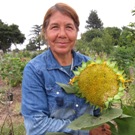 | Maria Seja, garden plot holder at the community garden. Initiated in 2010, the 4 acre Huerta del Valle is a community garden and urban agriculture project in Ontario that has grown out of collaboration between the Pitzer in Ontario Program and local community organizations. The project is supported by the City of Ontario and a partnership of organizations working to improve community health through comprehensive environmental, educational and policy strategies. Currently, 52 family plots are being managed, along with communal growing areas and a two-acre urban farm that grows vegetables for selling. Huerta del Valle also provides on-site community education courses. |
The Pitzer in Ontario Program is the Center’s local partner for our upcoming training workshop in September. Workshop attendees will be able to work with Arthur Levine—Pitzer in Ontario Community Garden Coordinator—lead a participatory needs assessment on Saturday the 19th with members of the Huerta del Valle community garden.
South El Monte
| Earthworks Farm and Community Garden |
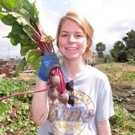 | A volunteer at Earthworks Farm. Earthworks Farm is a 4.9-acre work-training and educational urban farm located in the beautiful Whittier Narrows Recreational Area, east of downtown Los Angeles. Earthworks Farm facilitates multiple education programs benefiting the surrounding communities. |
These programs include workshops in organic farming, farm-to-school education, Harvest Tours, CSA, Farm-to-Table and volunteer opportunities. Earthworks Farm uses organic farming practices and grows a diverse array of crops. The mission of Earthworks Farm is to grow organic produce, promote local and sustainable agriculture, teach organic farming to community members and support a lifestyle of healthy eating and active living. Program Director, Marianne Zaugg, runs the farm with three employees and 10 to 15 volunteers. Volunteers who work 2 hours a week receive garden produce and volunteers who work 4 hours a week get a garden plot.
| San Dimas | The Constantine Family Garden and Orchard | |
 | Tim Constantine with his onions. The Constantine Family Garden and Orchard was established in 2012 by Tim and Peggy Constantine at his former family home in San Dimas. It was established to grow and harvest fruit and vegetables to be distributed in partnership with the Inland Valley Hope Partners at their food banks. The garden and orchard has provided many pounds of organic fruits and vegetables to their four pantries since the summer of 2012. The garden runs with volunteer support of the Claremont United Church of Christ, Damien High School, the University of La Verne, the Claremont Colleges, The Charles Foundation, and the TreePeople of Los Angeles. |
In the 1/4 acre garden, in the first year they produced 2,000 pounds of produce, 2,300 the second year, 2,800 the third year and hopes for 3,200 this year. Tim believes in growing what clients of the Inland Valley Hope Partners food banks want.
| Pomona | |
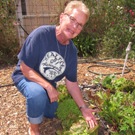 | Barbara Evans, Garden Coordinator for the organization Pomona Hope. In 2010 Pomona Hope leased an empty lot across the street from the Community Center of the First Presbyterian Church of Pomona for a Community Garden. In 2011 the garden was dedicated to the neighborhood as the Center Street Community Garden. |
The 1/3 acre garden has 51 garden plots; 1/2 of the participating families are from the immediate neighborhood. Barbara provides classes on food and gardening for kindergarten students through 8th grade. She has been successful in getting annual supplies donated from corporations like Home Depot.
| Pomona | Sarvodaya Farms |
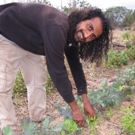 | Rishi Kumar at their Pomona urban farm. Sarvodaya Farms is a project of The Growing Club, a community organization dedicated to educating community members about the natural solutions to the world’s (sub)urban problems. Learn more about their classes, workshops, free videos, and more on their website. |
Beginning in 2011 the goal was to grow as much food as possible. “Since then, we have come to understand that the role of an urban farm should not be to simply grow food, but to inspire, educate, and enrich our community through the research and development of ideas, tools, and models which can create and develop sustainable communities of the future. The Growing Home strives to be a community resource where ideas can be created, developed, and exchanged.”
| Claremont | |
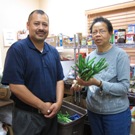 | Isaac Vega and a volunteer at the Claremont Satellite Food Pantry. Inland Valley Hope Partners believes in feeding the hungry and sheltering the homeless—and they serve people in a dozen cities. They run four food banks, provide emergency housing—and run a farmers’ market and a gleaning program where backyard gardeners can donate extra vegetable production to Hope Partners clients. |
Isaac is the Food Security Program Manager—and his program provides food to between 150 and 200 families a month. He has been successful in receiving regular donations from a USDA commodities program: Feed America. Hope Partners’ Director of Development and Communication, Kami Newman, feels that a major goal is to help move people forward to independence.
September Program Information
In this blended learning, three week training program you will participate in:
PHASE I: Three weeks.
- 2 weeks pre-workshop. Guided Field Data Collection: Community Needs Assessments. Conduct a needs assessment with a community where you work in preparation for use in the workshop—guided through distance learning by CSDi staff. We will provide all of the tools and information you need to conduct the needs assessments.
- 2 optional field days. Don’t have community access? Participate in two optional field days the Saturday and Sunday prior to the workshop conducting a participatory needs assessment with our local partner near the workshop venue.
- 5 days. A Face-to-Face Workshop. Full Project Design and Development. Working with the CSDi workshop leader, you will use your needs assessment to begin the development of a complete, fundable, launchable project.
We look forward to working with you in our training programs.
Sincerely,
Tim Magee, Executive Director
Center for Sustainable Development





